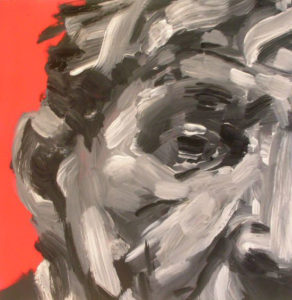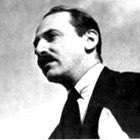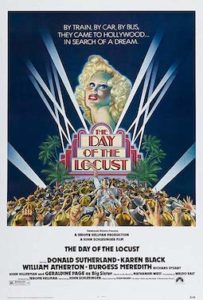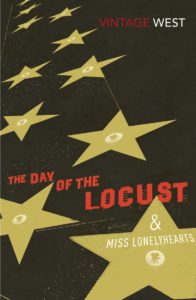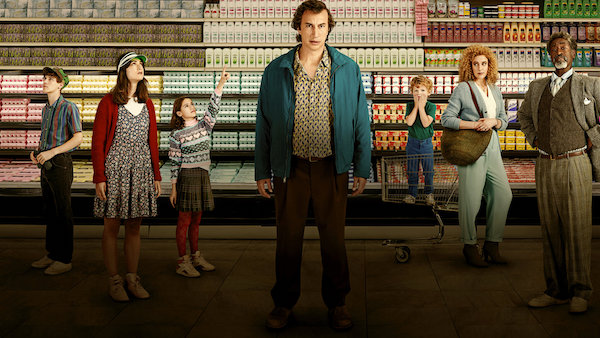
While I’m mildly optimistic about the announced adaptation of Neuromancer to Apple TV+, I found myself…stunned? aghast? tickled?—when I heard Netflix has adapted Don DeLillo’s White Noise to its streaming service. As I wrote on Mastodon and Twitter:
White Noise is not the kind of book one associates with popular entertainment, nor its author as the kind of person to acquiesce to its adaptation.
This merely touches the surface of my reaction to Netflix’s latest project.
If you’re not familiar, the novel White Noise is a 1985 literary comedy about Jack Gladney, a “professor of Hitler studies,” and his nuclear family in a fictional Midwestern college town. The early chapters depict suburban life as one soaked in crass consumerism, commercialism, and the ubiquitous nature of mass media. Things go pear-shaped when a railroad car spill on the edge of town triggers an “airborne toxic event,” leading to an evacuation and the concomitant strain on the family unit.
Remember, this is branded a comedy. The comic thrust of White Noise comes from its supposedly scathing parodies of American middle-class life. Take the novel’s opening paragraphs, where Gladney observes the college’s students returning to campus in single file:
The roofs of the station wagons were loaded down with carefully secured suitcases full of light and heavy clothing; with boxes of blankets, boots and shoes, stationery and books, sheets, pillows, quilts; with rolled-up rugs and sleeping bags; with bicycles, skis, rucksacks, English and Western saddles, inflated rafts. As cars slowed to a crawl and stopped, students sprang out and raced to the rear doors to begin removing the objects inside; the stereo sets, radios, personal computers; small refrigerators and table ranges; the cartons of phonograph records and cassettes; the hairdryers and styling irons; the tennis rackets, soccer balls, hockey and lacrosse sticks, bows and arrows; the controlled substances, the birth control pills and devices; the junk food still in shopping bags — onion-and-garlic chips, nacho thins, peanut creme patties, Waffelos and Kabooms, fruit chews and toffee popcorn; the Dum-Dum pops, the Mystic mints.
You’re forgiven if you stopped reading halfway through and skipped down. You didn’t miss anything.
Critic B. R. Myers categorizes this manner of list-making as a symptom of “a tale of Life in Consumerland, full of heavy irony, trite musing about advertising and materialism, and long, long lists of consumer artifacts, all dedicated to the proposition that America is a wasteland of stupefied shoppers.” That’s pretty much what the first half of White Noise adds up to. There’s more of these dreary lists in the book, and plenty of tin-eared dialogue to boot, as evidenced in this exchange between Gladney and his wife:
“It’s not the station wagons I wanted to see. What are the people like? Do the women wear plaid skirts, cable-knit sweaters? Are the men in hacking jackets? What’s a hacking jacket?”
“They’ve grown comfortable with their money,” I said. “They genuinely believe they’re entitled to it. This conviction gives them a kind of rude health. They glow a little.”
“I have trouble imagining death at that income level,” she said.
“Maybe there is no death as we know it. Just documents changing hands.”
“Not that we don’t have a station wagon ourselves.”
“It’s small, it’s metallic gray, it has one whole rusted door.”
Or this moment—the most famous in the book—when Gladney’s school-aged daughter talks in her sleep:
She uttered two clearly audible words, familiar and elusive at the same time, words that seemed to have a ritual meaning, part of a verbal spell or ecstatic chant.
Toyota Celica.
A long moment passed before I realized this was the name of an automobile. The truth only amazed me more. The utterance was beautiful and mysterious, gold-shot with looming wonder. It was like the name of an ancient power in the sky, tablet-carved in cuneiform.
I suppose for a certain type of person, this is a scream, gold-shot and looming. I’m not that type of person.
It’s the phoniness of White Noise I can’t let go of. The excuse of “it’s a satire” does not forgive the writer from grasping and depicting the reality of a situation. The power of satire is to capture the genuine and turn its underbelly over to tickle it—to reveal its absurdities in both premise and execution. DeLillo never accomplishes this. Professors don’t inventory their students’ goods from afar; husbands don’t tell their wives that the station wagon has a junky door (when any wife would full-well know this); and if a daughter was repeating a car make and model in her sleep, no one would declare it a religious experience. The absurdity of White Noise is not the mindless consumers populating it, but that this novel somehow is considered a smart skewering of them.
Compare the above to George Carlin’s ridiculing of American materialism in his infamous “Stuff” sketch:
DeLillo’s range-finding jabs are timid compared to Carlin’s honed wit, from the basic observation that homes are just lockboxes for our precious objects, to the game-theoretic anguish of weighing which personal goods make the cut for an overnight excursion. He even indulges in his own Consumerland-like list (“Afrin 12-hour decongestant nasal spray”) that is far briefer, funnier, and better-curated than DeLillo’s weary catalogs. The laughs aren’t merely at Carlin’s on-stage antics, but in the gnawing sensation that we’re guilty of what he’s describing—and Carlin’s tacit admission that he’s guilty of it, too. Meanwhile, in White Noise, we’re supposed to be chortling at the mindlessness of our inferiors. DeLillo is othering America—for whose benefit? Why, Americans like him: Americans who deny their American-ness.
(In this sense, I suspect the Netflix adaptation will execute much like Adam McKay’s smug Don’t Look Up, a spoof also predicated on an America stupefied by cable television and fast food.)
It’s not merely the elitism that fails to connect. Gladney’s field of “Hitler studies” is never really fleshed out. It could have been a fascinating device (although it risked from page one falling into the trap of Godwin’s Law). As the book wears on, the Hitler studies thing feels like a gag DeLillo thought would reap comic gold, and only realized chapters in that the idea had run out of gas. The best he can do is have Gladney deliver a lecture comparing Hitler to Elvis Presley—there’s your Godwin’s Law at work. When Gladney admits he’s only recently learned German, you realize how thin the satire really is: This is not a real professor of Hitler studies.
When I say “Gladney is not a real professor of Hitler studies,” I don’t mean it in the same way that W. H. Auden said Shrike is not a real newspaper editor in Nathanael West’s Miss Lonelyhearts. Auden meant that Miss Lonelyhearts is not about newspapermen or journalism—the premise of a man taking a position as an advice columnist is merely a convenience to place the book’s heart-wrenching confessional letters into his hands. Gladney’s field is very much intended to satirize him and academia, but the joke is never explored and left unfulfilled. It becomes a shingle to hang around Gladney’s neck, doing precious little to inform his worldview or way of life.
The main course for White Noise, though, is the American bourgeoisie. The metaphysics of supermarkets are discussed by the book’s characters (always with a straight face). Death is discussed in excruciating abstractions and legalistic terms. The book concludes with Gladney looking out over a hazy dusk, the air thick with toxic chemicals, and admiring its beauty. (No—really.)
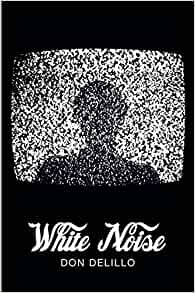
What’s the problem with Netflix adapting the book? In truth, I don’t care much one way or the other. What stunned me—and motivated those posts on social media—is that White Noise was always intended to be a sharp poke in the eye for middle America, with plenty of scorn reserved for major corporations and the mass media.
In other words, White Noise satirizes the type of corporation that’s adapting it into a movie, mocks the people that corporation will be marketing the film at, and despises the corporation collecting its profits as the mindless mob watches on from the comfort of the sofas in their McMansions, with their living rooms, their family rooms, their bedrooms, their candy rooms, their office rooms, their great rooms.
Why do they have great rooms?
What is a great room?
